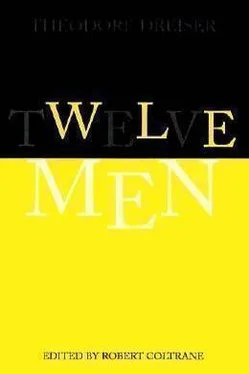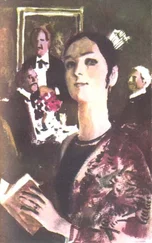Теодор Драйзер - Twelve Men
Здесь есть возможность читать онлайн «Теодор Драйзер - Twelve Men» весь текст электронной книги совершенно бесплатно (целиком полную версию без сокращений). В некоторых случаях можно слушать аудио, скачать через торрент в формате fb2 и присутствует краткое содержание. Год выпуска: 2014, Издательство: epubBooks Classics, Жанр: Биографии и Мемуары, на английском языке. Описание произведения, (предисловие) а так же отзывы посетителей доступны на портале библиотеки ЛибКат.
- Название:Twelve Men
- Автор:
- Издательство:epubBooks Classics
- Жанр:
- Год:2014
- ISBN:нет данных
- Рейтинг книги:4 / 5. Голосов: 1
-
Избранное:Добавить в избранное
- Отзывы:
-
Ваша оценка:
- 80
- 1
- 2
- 3
- 4
- 5
Twelve Men: краткое содержание, описание и аннотация
Предлагаем к чтению аннотацию, описание, краткое содержание или предисловие (зависит от того, что написал сам автор книги «Twelve Men»). Если вы не нашли необходимую информацию о книге — напишите в комментариях, мы постараемся отыскать её.
Twelve Men — читать онлайн бесплатно полную книгу (весь текст) целиком
Ниже представлен текст книги, разбитый по страницам. Система сохранения места последней прочитанной страницы, позволяет с удобством читать онлайн бесплатно книгу «Twelve Men», без необходимости каждый раз заново искать на чём Вы остановились. Поставьте закладку, и сможете в любой момент перейти на страницу, на которой закончили чтение.
Интервал:
Закладка:
I looked quizzically into his eyes to see what effect this would have, and if there was no evidence of a mist of pleasure and affection being vigorously restrained I was very much mistaken. Something seemed to hold the man in helpless silence as he gazed vacantly at nothing. He breathed heavily, then drew himself together and lifted one of his big hands, as if to touch me, but refrained.
"Yes, brother," he said after a time, "I am ."
"Well, that's good," I replied, taking a slight mental exception to the use of the word brother. "What makes you contented?"
"I don't know, unless it is that I've found out what I ought to do. You see, I need so very little for myself that I couldn't be very unhappy."
"What ought you to do?"
"I ought to love my fellowmen."
"And do you?"
"Say, brother, but I do," he insisted quite simply and with no evidence of chicane or make–believe—a simple, natural enthusiasm. "I love everybody. There isn't anybody so low or so mean but I love him. I love you, yes, I do. I love you."
He reached out and touched me with his hand, and while I was inclined to take exception to this very moral enthusiasm, I thrilled just the same as I have not over the touch of any man in years. There was something effective and electric about him, so very warm and foolishly human. The glance which accompanied it spoke, it seemed, as truthfully as his words. He probably did love me—or thought he did. What difference?
We lapsed into silence. The scene below was so charming that I could easily gaze at it in silence. This little house was very simple, not poor, by no means prosperous, but well–ordered—such a home as such a man might have. After a while I said:
"It is very evident that you think the condition of some of your fellowmen isn't what it ought to be. Tell me what you are trying to do. What method have you for improving their condition?"
"The way I reason is this–a–way," he began. "All that some people have is their feelings, nothing else. Take a tramp, for instance, as I often have. When you begin to sum up to see where to begin, you find that all he has in the world, besides his pipe and a little tobacco, is his feelings. It's all most people have, rich or poor, though a good many think they have more than that. I try not to injure anybody's feelings."
He looked at me as though he had expressed the solution of the difficulties of the world, and the wonderful, kindly eyes beamed in rich romance upon the scene.
"Very good," I said, "but what do you do? How do you go about it to aid your fellowmen?"
"Well," he answered, unconsciously overlooking his own personal actions in the matter, "I try to bring them the salvation which the Bible teaches. You know I stand on the Bible, from cover to cover."
"Yes, I know you stand on the Bible, but what do you do? You don't merely preach the Bible to them. What do you do?"
"No, sir, I don't preach the Bible at all. I stand on it myself. I try as near as I can to do what it says. I go wherever I can be useful. If anybody is sick or in trouble, I'm ready to go. I'll be a nurse. I'll work and earn them food. I'll give them anything I can—that's what I do."
"How can you give when you haven't anything? They told me in Noank that you never worked for money."
"Not for myself alone. I never take any money for myself alone. That would be self–seeking. Anything I earn or take is for the Lord, not me. I never keep it. The Lord doesn't allow a man to be self–seeking."
"Well, then, when you get money what do you do with it? You can't do and live without money."
He had been looking away across the river and the bridge to the city below, but now he brought his eyes back and fixed them on me.
"I've been working now for twenty years or more, and, although I've never had more money than would last me a few days at a time, I've never wanted for anything and I've been able to help others. I've run pretty close sometimes. Time and time again I've been compelled to say, 'Lord, I'm all out of coal,' or 'Lord, I'm going to have to ask you to get me my fare to New Haven tomorrow,' but in the moment of my need He has never forgotten me. Why, I've gone down to the depot time and time again, when it was necessary for me to go, without five cents in my pocket, and He's been there to meet me. Why, He wouldn't keep you waiting when you're about His work. He wouldn't forget you—not for a minute."
I looked at the man in open–eyed amazement.
"Do you mean to say that you would go down to a depot without money and wait for money to come to you?"
"Oh, brother," he said, with the softest light in his eyes, "if you only knew what it is to have faith!"
He laid his hand softly on mine.
"What is car–fare to New Haven or to anywhere, to Him?"
"But," I replied materially, "you haven't any car–fare when you go there—how do you actually get it? Who gives it to you? Give me one instance."
"Why, it was only last week, brother, that a woman wrote me from Maiden, Massachusetts, wanting me to come and see her. She's very sick with consumption, and she thought she was going to die. I used to know her in Noank, and she thought if she could get to see me she would feel better.
"I didn't have any money at the time, but that didn't make any difference.
"'Lord,' I said, 'here's a woman sick in Maiden, and she wants me to come to her. I haven't got any money, but I'll go right down to the depot, in time to catch a certain train,' and I went. And while I was standing there a man came up to me and said, 'Brother, I'm told to give you this,' and he handed me ten dollars."
"Did you know the man?" I exclaimed.
"Never saw him before in my life," he replied, smiling genially.
"And didn't he say anything more than that?"
"No."
I stared at him, and he added, as if to take the edge off my astonishment:
"Why, bless your heart, I knew he was from the Lord, just the moment I saw him coming."
"You mean to say you were standing there without a cent, expecting the Lord to help you, and He did?"
"'He shall call upon me, and I shall answer him,'" he answered simply, quoting the Ninety–first Psalm.
This incident was still the subject of my inquiry when a little colored girl came out of the yard and paused a moment before us.
"May I go down across the bridge, papa?" she asked.
"Yes," he answered, and then as she tripped away, said:
"She's one of my adopted children." He gazed between his knees at the sidewalk.
"Have you many others?"
"Three."
"Raising them, are you?"
"Yes."
"They seem to think, down in Noank, that living as you do and giving everything away is satisfactory to you but rather hard on your wife and children."
"Well, it is true that she did feel a little uncertain in the beginning, but she's never wanted for anything. She'll tell you herself that she's never been without a thing that she really needed, and she's been happy."
He paused to meditate, I presume, over the opinion of his former fellow townsmen, and then added:
"It's true, there have been times when we have been right where we had to have certain things pretty badly, before they came, but they never failed to come."
While he was still talking, Mrs. Potter came around the corner of the house and out upon the sidewalk. She was going to the Saturday evening market in the city below.
"Here she is," he said. "Now you can ask her."
"What is it?" she inquired, turning a serene and smiling face to me.
"They still think, down in Noank, that you're not very happy with me," he said. "They're afraid you want for something once in a while."
She took this piece of neighborly interference in better fashion than most would, I fancy.
"I have never wanted for anything since I have been married to my husband," she said. "I am thoroughly contented."
Читать дальшеИнтервал:
Закладка:
Похожие книги на «Twelve Men»
Представляем Вашему вниманию похожие книги на «Twelve Men» списком для выбора. Мы отобрали схожую по названию и смыслу литературу в надежде предоставить читателям больше вариантов отыскать новые, интересные, ещё непрочитанные произведения.
Обсуждение, отзывы о книге «Twelve Men» и просто собственные мнения читателей. Оставьте ваши комментарии, напишите, что Вы думаете о произведении, его смысле или главных героях. Укажите что конкретно понравилось, а что нет, и почему Вы так считаете.









